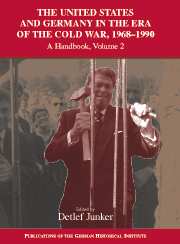Book contents
- Frontmatter
- POLITICS: Détente and Multipolarity: The Cold War and German-American Relations, 1968-1990
- 1 The United States and the German Question
- 2 The Federal Republic of Germany Between the American and Russian Superpowers - “Old Friend” and “New Partner”
- 3 Ostpolitik: Détente German-Style and Adapting to America
- 4 Creative Tension: The United States and the Federal Republic in the CSCE
- 5 The United States, Germany, and the Multilateralization of International Relations
- 6 Expectations of Dominance and Partnership Rhetoric: The Federal Republic of Germany in the Crossfire of American and French Policy, 1945-1990
- 7 West Germany and European Unity in U.S. Foreign Policy
- 8 Cooperation and Conflict in German and American Policies toward Regions Outside Europe
- 9 Two States, One Nation: The International Legal Basis of German-American Relations from Ostpolitik to Unification
- 10 The U.S. Congress and German-American Relations
- 11 The German Political Parties and the USA
- 12 The Role of East Germany in American Policy
- 13 The United States and German Unification
- SECURITY: German-American Security Relations, 1968-1990
- ECONOMICS: Cooperation, Competition, and Conflict: Economic Relations Between the United States and Germany, 1968-1990
- CULTURE: Culture as an Arena of Transatlantic Conflict
- SOCIETY: German-American Societal Relations in Three Dimensions, 1968-1990
- 1 “1968”: A Transatlantic Event and Its Consequences
- OUTLOOK: America, Germany, and the Atlantic Community After the Cold War
- Index
11 - The German Political Parties and the USA
Published online by Cambridge University Press: 05 January 2013
- Frontmatter
- POLITICS: Détente and Multipolarity: The Cold War and German-American Relations, 1968-1990
- 1 The United States and the German Question
- 2 The Federal Republic of Germany Between the American and Russian Superpowers - “Old Friend” and “New Partner”
- 3 Ostpolitik: Détente German-Style and Adapting to America
- 4 Creative Tension: The United States and the Federal Republic in the CSCE
- 5 The United States, Germany, and the Multilateralization of International Relations
- 6 Expectations of Dominance and Partnership Rhetoric: The Federal Republic of Germany in the Crossfire of American and French Policy, 1945-1990
- 7 West Germany and European Unity in U.S. Foreign Policy
- 8 Cooperation and Conflict in German and American Policies toward Regions Outside Europe
- 9 Two States, One Nation: The International Legal Basis of German-American Relations from Ostpolitik to Unification
- 10 The U.S. Congress and German-American Relations
- 11 The German Political Parties and the USA
- 12 The Role of East Germany in American Policy
- 13 The United States and German Unification
- SECURITY: German-American Security Relations, 1968-1990
- ECONOMICS: Cooperation, Competition, and Conflict: Economic Relations Between the United States and Germany, 1968-1990
- CULTURE: Culture as an Arena of Transatlantic Conflict
- SOCIETY: German-American Societal Relations in Three Dimensions, 1968-1990
- 1 “1968”: A Transatlantic Event and Its Consequences
- OUTLOOK: America, Germany, and the Atlantic Community After the Cold War
- Index
Summary
Translated by Eric Weinberger
The East-West conflict defined the terms of German-American relations until 1990, considerable fluctuations in the intensity of that conflict notwithstanding. West Germany's dependence on American protection determined where the country stood politically in the later decades of the Cold War, as it had before 1968, and colored the views the West German parties held of the relationship between their country and the United States. The Harmel Report issued by NATO in 1967 had called for equal weight to be given to defense and détente in the interests of European security. West Germany's political parties differed on security policy in large part because they placed different weight on defense and détente and, consequently, placed different value on relations with the United States. Moreover, positive attitudes toward the United States began to fade in the mid-1960s, when America became the focus of criticism - especially from the younger generation - for its methods of warfare in Indochina. The loss of faith in American politics, aggravated by the Watergate scandal, cast increasing doubt on taking America as a role model.
Beginning in the late 1970s, skepticism about the motives and goals of American policy began to spread within the Social Democratic Party of Germany (SPD) and among the Greens. The Reagan administration’s distinctive combination of a focus on American interests, Manichaean worldview, and sense of political mission helped spur the SPD and the Greens to question the wisdom of West Germany’s security dependence on the United States. Their unease would persist throughout the Reagan era. However, the Christian Democratic Union (CDU), the Christian Social Union (CSU), and the Free Democratic Party (FDP) functioned as a domestic counterbalance to those critical of the United States.
- Type
- Chapter
- Information
- The United States and Germany in the Era of the Cold War, 1945–1990A Handbook, pp. 89 - 95Publisher: Cambridge University PressPrint publication year: 2004



